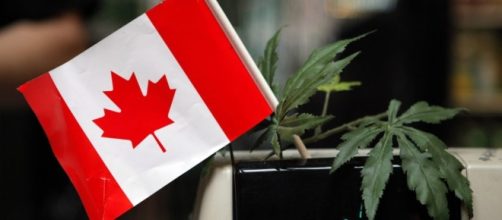Marijuana will soon be legal in Canada. America's northern neighbor is moving quickly to normalize it's pot laws by becoming the second country in the world, following Uraguay, to permit the recreational use of cannabis. The implications for the United States--and the Trump administration--could be huge.
Canada is one of America's largest trading partners and "a country that the U.S, trusts, tends to see as a peer," says John Hudak, an expert on marijuana policy at the Brookings Institute. Therefore, a major tilt towards cannabis reform coming from Quebec is bound to impact policymakers in Washington.
Canada ready to capitalize on recreational marijuana?
President Justin Trudeau's Canadian government is expected to announce their plan to legalize pot on or around April 10th. According to Sam Kamin, an expert on marijuana law who teaches at the University of Denver, Canada stands to benefit economically and businesswise relative to the United State by reforming its drug laws first. For instance, Kamin expects Canada to lure significant investor capital to fuel an industry with major growth potential. By acting ahead of the U.S., Canada stands to gain the first mover advantage.
America's homegrown cannabis economy
Currently, 30 states in the U.S. have approved legislation allowing patients to use medical marijuana.
In addition, eight states have passed laws permitting retail sales. According to estimates, Americans spent $6.7 billion on pot in states where it was legal in 2016.
The addition of major economies like Canada, California, and Massachusetts could help make the total marijuana marketplace in North America a $20 billion industry within the next 3 years. Some think that's a conservative estimate and that $50 billion is more like it.
In fact, legal weed has been a tremendous economic multiplier for states that have approved recreational measures. For example, Colorado added 18,000 new marijuana-related jobs and economic experts contend that each $1 spent in the cannabis economy generates $2.4 in economic activity.
Where does Trump stand on the economics of cannabis?
To date, the Trump administration has sent mixed messages about marijuana. On the one hand, Trump appointed the notorious anti-pot zealot, Jeff Sessions, to be Attorney General. Both he and White House spokesman, Sean Spicer, have hinted at a possible federal crackdown on states that have established legal marijuana marketplaces.
However, Trump himself rarely talks (or tweets) about cannabis. This has led some to surmise that the President--who has a reputation as a pragmatic businessman, will direct his subordinates to pursue other priorities. Policy analysts tend to agree, however, that federal intervention into state markets would sow uncertainty and create chaos in state economies that are increasingly reliant on marijuana sales to generate tax revenue, close budget gaps, and jumpstart economic activity.
The cannabis caucus in Washington
In the meantime, mainstream political leaders in both political parties are trying to institute reforms at the federal level that will move marijuana out of the black market and make it a cash crop that generates jobs and tax receipts.
The formation of the first ever Cannabis Caucus by respected elders like Dana Rohrabacher and Earl Blumenauer is indicative that at least some leaders in Washington recognize the pros of normalizing America's relationship with marijuana far outweigh the cons associated with maintaining the current pot prohibition.
Momentum for recreational pot has been gaining steam at the state level. Now, America's neighbor to the North appears to be taking steps that will accelerate this trend. Increasingly, it looks like like a lot of people are banking on marijuana to be a gateway to greater economic activity.

